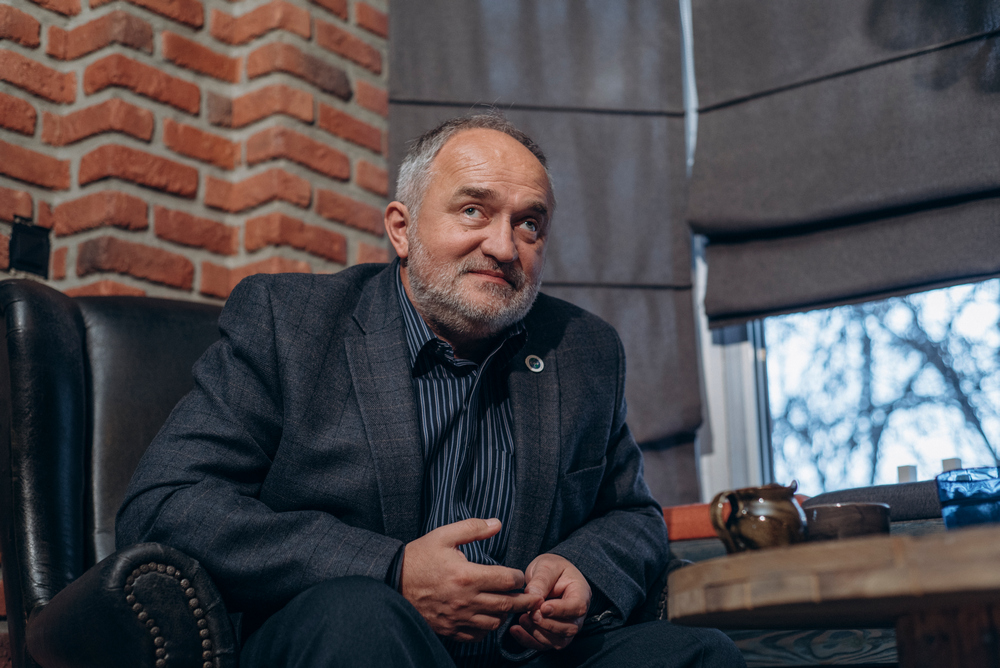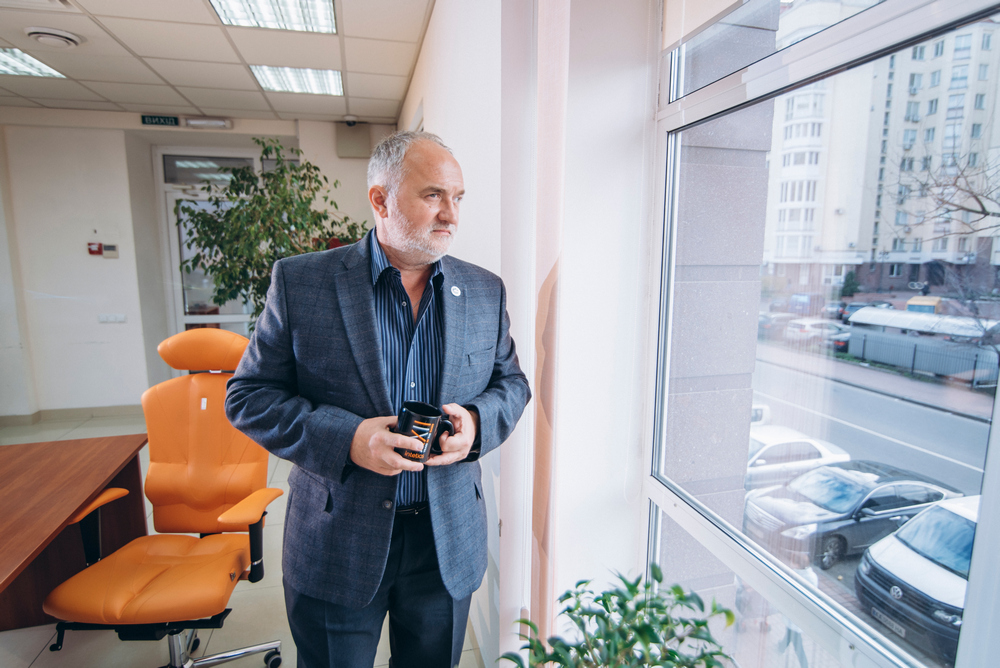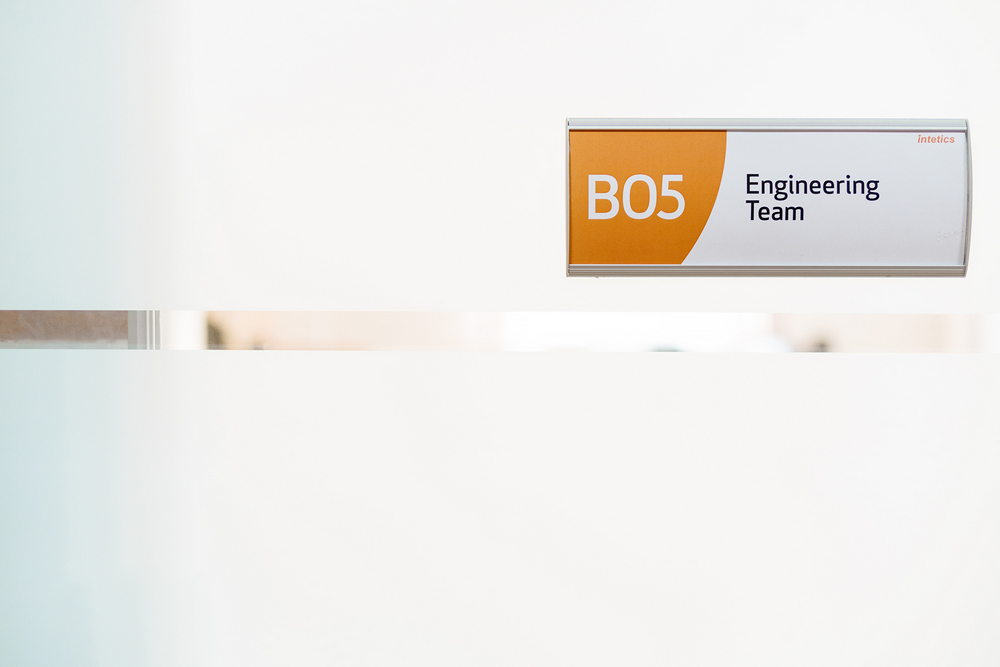Intetics was founded in Minsk back in 1995, in the early days of Belarussian outsourcing. Today it is a mature software development service provider and one of the top 50 outsourcing companies in the world. The company promotes predictive software engineering principles and the technical debt reduction approach. It delivers powerful software products: practically every German and Japanese car features a navigation map of Ukraine created by Intetics. Last year the company’s software won a prize for Best Technological Project in Africa. The omnichannel platform for sports bets used by tens of millions of people was also developed by Intetics. The list is very long!
At the start of 2020, Intetics is celebrating its 25th anniversary. The fact that through all these years the business developed, overcame crises and kept growing means only one thing: it was headed by a wise leader with a serious mindset. In this interview, CEO of Intetics Boris Kontsevoi talks about the company crises, his attitude to business forecasts and the differences between Belarusians, Ukrainians and Russians.
Through different business models to the simple mission
– Boris, 25 years ago the term “outsourcing” did not exist. “Offshore outstaffing also appeared later. Intetics was founded almost simultaneously with the World Wide Web. How did the company see itself during those first years, and what triggered the creation of the Remote In-Sourcing model?
“Guys, he says he’s developing software for the United States!”
– This is a lifelong story. We are doing the same thing now that we did 25 years ago, which is software development. What’s been changing is the marketing package. First it was Custom Software Development, then Web Design and Development, and then the Offshore Dedicated Team (our first reaction to the West’s distrust of East European software development).
I remember crossing the US border in 1998. As usual, the border guard asks: “So, what the hell are you doing here?” (not in those exact words, of course). I answer, “Visiting a client. We develop software.” He starts laughing loudly, gets out of this glass booth and yells throughout the hall: “Guys, he says he’s developing software for the United States!” Everybody’s laughing, but they let me through.

Later on, we came to provide different offers: software development, web development, and outstaffing. Remote In-Sourcing became the pinnacle of our outstaffing in 2011. We wanted to teach our competitors a lesson 🙂 Some even tried to “quote” it; they just copied us shamelessly. Now everything is going back to basics. Clients are ready to listen; they finally believe in our software development expertise.
– Sometimes young IT companies put the cart before the horse. Can you give useful advice to these entrepreneurs and startups: who and when needs a strategy and mission? How do you define these in your company?
– To be honest, the mission put in the shape of a promotional mission statement is just a promo, an advertisement. You know it, your employees know it and your clients know it too. So, why bother? Write one to pay tribute to the rules, and then forget about it 🙂 What is important is your goal/strategy, the destination you’re heading towards. It’s like a litmus test. It is a great validator for everything you do. Are you close to your goal? Great! Did you go the wrong way? Find a way back!
Strategic planning and forecasts
– What is your approach to strategic planning? Is it something that takes long to create and that should not undergo major changes? Or is it a flexible roadmap that can (and must) be continuously changed?
– “Strategic planning” is a methodology, not a specific program. Some examples are the Chicago School of Economics, Asian Tigers, “UN anti-corruption practices”, and so on. Choose what you like and follow. There’s also the theory of success, in general and special cases. The point is: if you want it, then take it and apply it. Though I think it’s not only about wanting; it’s also about having the will to get there.
Some people might interpret strategic planning as “I am the smartest guy in the room; I know everything.” To me this equals a lack of foresight (i.e. stupidity), or propaganda. No one is that smart. Not even the Communist Party of China, which creates a half-year program and makes no changes to it afterwards. It doesn’t happen like that. Life is richer than our perception of it. So, I would say that planning for me is more like a roadmap and goal, which can be achieved with the right attitude towards reality and constant corrections.
– Nassim Taleb is skeptical about forecasting. But without it, it’s impossible to create a business. If you follow a random path, you’ll get nowhere. What’s closer to the Intetics worldview: “A forecast helps us live and grow” or “Sometimes it’s right, sometimes it’s not, success is likely to be caught”? Have you learnt how to leverage chaos?
– It would be cool to understand how Murphy’s Law works – and that’s exactly what Mr. Taleb strives to do. The truth is, as hard as you try to develop an ideal plan, a bombshell can drop on your house at any time. Forecasting is not about me. 🙂
Set yourself a reference point. Ours, for example, is to have 1000 employees by 2020. The next is to become one of the top 10 software development companies in Eastern Europe. Define clear reference points and do your best to reach them. You can’t know what stumbling blocks you’ll encounter along the way. You’ll just have to deal with them as they come up. In general, solve problems as they arise.
As for chaos, there’s nothing you can get out of it. It’s chaos. When the storm calms down, some structure will appear, and those with good vision will find a way to get the best out of it.
– What stands behind your brand?
– I believe in true emotions. Back in 2003, I’d already been in the IT industry for 8 years. The competition had become really strong. Most IT companies used either blue or turquoise as their corporate color. I was tired of this stereotype. Also, when my first partner let me down, I wanted to emphasize that business should and can be ethical. This is how we chose our warm orange color and ethics became part of the name. Intetics is an amalgam of the words internet technology and ethics.
Western and “Soviet” mindset differences
– People in Eastern Europe and the US think very differently. What did you have to change in the Belarusian (post-Soviet) mindset (yours and Intetics employees’) to successfully work with clients around the world?
– Nothing. I may have tried, but it is not in my power to change the national mindset. However, I do hope that at the very least I managed to show everyone their place in the hierarchy of world professionals. A very unpleasant trait of the Belarusians and Ukrainians is that they hold themselves in very high esteem with no regard for others’ opinions. They therefore tend to be underestimated by Western clients. The turning point for them would be to understand that it’s their clients’ opinion that determines their worth as a professional. If they say you are a superstar, then you really are! I don’t like the idea of “positive self-esteem”. Other people’s opinions should be our real reference point.

– How can the Belarusian mindset be beneficial? Are there any specific features that make Belarusians competitive in the global market?
– Good question 🙂 The same as above. If your client endorses you – well done. By the way, a simple test is to look at your LinkedIn endorsements. I mean from clients, not your colleagues.
As for the ‘Soviet’ Slavic mindset, my observations in programming are as follows (and apologies in advance; I don’t mean to hurt anyone’s feelings):
Belarusians. Have the strongest will, with elements of individual heroism. We (and I include myself here – as per my DNA test, I am 96% Belarusian) are very disciplined and know how to listen.
Ukrainians. The most careless, and never change an opinion. They defend individual freedom, which sometimes creates chaos. It can be extremely difficult to manage them.
Russians. The most educated and competent, though with very poor customer-care culture. They love groups and hierarchy, though they think of themselves as individually free.
Once again, I do not want to hurt anyone’s feelings. Talking about national mindsets is a double-edged sword. I haven’t said anything yet about our relationship with money and social values. It’s not a secret though. Russians are sacrificial; Ukrainians are highly scrupulous; Belarusians are prudent. They also have something in common: $100 is not a significant amount of money, even though nobody has $100.
For comparison, the Americans – who developed at least 80–90% of the world’s software – treat work without emotions of any kind. It’s just business for them. They work even if there is a lack of resources. Despite all the myths about ‘slow, stupid, lazy’ Americans, their results, and especially their meetings, are more productive than ours (I find myself somewhere in between them and us). In other words, they are rich because they work really hard, not because they are thieves.
Simple crash recovery recipe
– In the early days of Intetics, the company office was robbed. What if your partners hadn’t been able to help you buy new computers? Do you think the company history would have been totally different? What other pitfalls did you stumble upon through all these years? What conclusions did you make?
– We are turning 25 and it’s a success story, right? By the way, the fact that the company has been in operation for so long is a statistical success. Although, in these 25 years we’ve also had some catastrophes. So:
–1995 Our first three corporate computers (they were very expensive; each cost the same as an apartment in Minsk) were stolen 24 hours before the insurance policy was bought.
– 1999 We lost our major client. Corporate staff was reduced from 60 to 20 employees.
– 2003 One of our clients left and took 20% of our business. Actually this was valuable experience rather than a catastrophe, as we didn’t have any financial issues as a result.
– 2006 Total stagnation due to internal disagreement.
– 2010 One fourth of business lost due to internal disagreement.
– 2012 As above, but the funny thing is that the growth overtook the losses.
– … It’s been good so far. However, the market has become smarter and more difficult.
They say you should learn from that, draw conclusions and make adjustments. Well, true, but you know, some things are obvious even without catastrophes. For example, that you should get insurance along with the valuables, not the day after. 🙂
The catastrophes are never the same. Even when they’re similar, like the two we had in 2010 and 2012, they’re still very different. The solution is simple – stand up and fight. I love quoting Jaroslav Hašek: “It’s never happened that there was nothing.” Reconstruction is necessary when progress starts slowing down.
It is something that very few people understand – changes are needed when everything is fine, not when everything is lost.

– What is the biggest mistake you made during 25 years at Intetics? What did you learn from it?
– I do not believe in learning from mistakes. A mistake can be prevented only when you know that you are going to make it. But we never make mistakes on purpose, right? Having fallen once, you get up and continue walking, and try to prevent further mistakes. But you’ll make them anyway.
Now I’m going to say something that might be difficult to understand: I have made more wrong than right decisions in my life. What’s important is not that your initial decision was right, but that you actually made a decision. You can then adjust your direction with subsequent reactions and corrections. This approach requires a great deal of self-criticism and flexibility. If you are deeply in love with yourself and everybody is to be blamed but you, you’ll never achieve anything.
But to get back to the point, my biggest mistake is trusting people too much. And despite all the drama it’s caused, it’s not something I’m willing to change.
Predictive development and future place of human in programming
– “Data is the new oil.” Have data and deep analytics become the basis for predictive engineering?
– Data is becoming or has already become the most important raw material, although we don’t always know how to process it. The complicated chemistry of carbohydrate processing did not just appear overnight. Likewise, we are still learning and continue to do so in order to create complicated chemistry in our BPO department. Predictive engineering is about software. Read more here. By the way, I invite all software engineers to join and contribute to the predictive engineering community!
Will there be place for traditional outsourcing (“ordered–delivered”) in the future, or will all custom software development services be predictive? Well, we’ll see. I do hope that software engineering will become predictive.

– What do you think about AI and IT companies’ future in this domain? Do you think they’ll turn into limited neural network service teams? How about AIntetics?
– They won’t turn into service teams. Data processing is a complicated chemistry that allows automating numerous processes and, possibly, some elements of programming. Still, I don’t think it can substitute a human brain.
I’m hoping that nobody seriously believes that the “I” in AI really stands for “intelligent”. There will always be a place for people in programming.
Ikigai concept
– Boris, you are a role model and inspiration to a lot of people at Intetics. Do you have anyone like that in your life? Who do you learn from? Whose business, technological, community ideas drive you?
– I regard “industry analytics” as my teacher, not professors and mentors. I mean industry reports, conferences, workshops, and, of course, real professionals. If we are talking about specific people in my life, those who influenced me heavily and triggered life-changing decisions in my life, there are many. The most influential for me were (I won’t mention my parents and family, as that goes without saying!):
● My brother, Valentin Kontsevoi, who defined my education.
● My university colleague, and my boss for a certain period, Sergei Dobrinevsky, who inspired me to launch this business.
● The husband of my wife’s friend’s sister (!) and my client, Semyon Gantman. He inspired me to move to the US. He was my wisdom and support. He’s not with us anymore; may he rest in peace.
● My colleague and company employee from 1995, Anatoly Soltan. One of the brightest men I’ve known. He greatly supported me during the 1999 crisis and automation of our marketing. Unfortunately, he also is no longer with us.
● Another client, partner, friend – Gene Lynetsky. A great man; his derivative thinking was somewhere at the level of 2.5–3 (mine is 1.5–2). He pulled the rug out from under my feet so many times that I probably grew wiser as a result. I bought my first house in the US thanks to his startup.
– The Japanese have a great concept, ikigai, something that wakes you up in the morning. What is your ikigai?
– I’ve often wondered what “drive” meant for me and others. It’s not just any old thing. More than anything, it’s the desire to “let’s get together and create something”. Every time/period, it’s some new project, idea or challenge. I never had a personal ikigai like “learn French”, “study karate” or “read classics”; for me, it was my children and work, and maybe intellectual curiosity. Without new information, I would probably wither away. But I think everyone needs ikigai. I hope everyone finds theirs!
